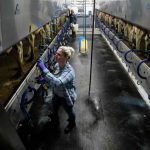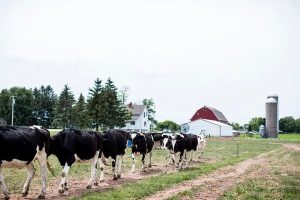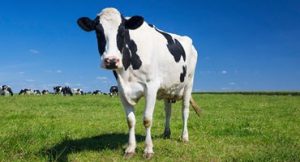
As the 118th Congress prepares to debate the 2023 Farm Bill in September, lawmakers and farmers met to discuss priorities most important to Virginia’s agricultural producers.
Maple Springs Farm in Augusta County was a tranquil venue for a July 17 roundtable event hosted by Rep. Ben Cline, R-6th, with Rep. Glenn “GT” Thompson, R-15th, a Pennsylvania congressman and chair of the House Committee on Agriculture.
Among the farm bill’s 12 titles are provisions for commodity programs like dairy margin coverage and agricultural workforce development.
Thompson, a writer of the farm bill, shared his outlook as legislators draft the five-year omnibus spending package.
“Our goal is we do this in a bipartisan way, on time and highly effectively,” he said. “The overall vision is to restore a robust rural economy.”
Virginia’s dairy farmers weighed in on their priorities, like modernizing Dairy Margin Coverage. The DMC is an insurance program in which producers pay premiums for protection when the difference between the milk price and the average feed price, or margin, falls below a certain dollar amount.
“The prices for milk right now are pretty dire, and our margins are not there as they should be,” said Kevin Craun, commissioner of the Virginia State Milk Commission. “All we’re looking for is a safety net. We don’t want our income from the government. No farmer does.”
The DMC program, enacted in the 2018 Farm Bill, has been successful, though it could use more modernization, as coverage is based on outdated production records, said Eric Paulson, executive director of the Virginia State Dairymen’s Association.
Dairies are lost or concentrated during challenging times, Thompson acknowledged.
“The average farm size gets bigger as we have fewer of them,” he explained. “We’ll deal with the safety nets in the farm bill.”
Virginia Farm Bureau Federation Young Farmer Thomas French, a Shenandoah County dairyman, thanked Thompson for his work on the Agriculture Labor Working Group and asked to see an adjustment of status for agricultural workers. Livestock producers don’t have access to seasonal H-2A labor because they operate year-round.
The group’s upcoming interim report will examine variables impacting the uncertainty of the agricultural workforce and implications on food security, Thompson said.
“Then we’ll be writing an American food security bill as it relates to the ag workforce.”























